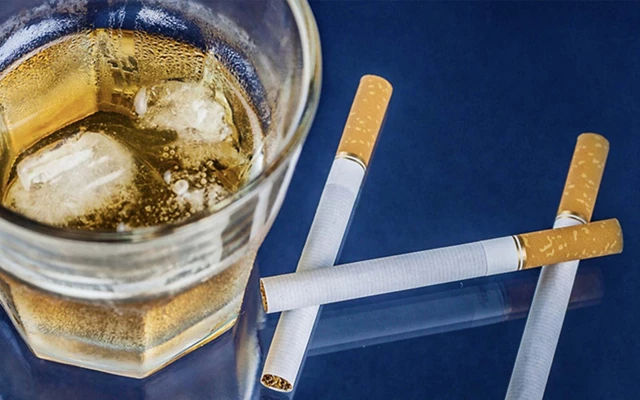Alcohol during pregnancy
While you may find the odd glass of wine or beer is the perfect accompaniment to a meal, or a way to help you unwind at the end of the day, the NHS advice to cut out alcohol during pregnancy is for good reason.
Learn why it’s best to avoid alcohol when you’re pregnant, advice for if you have been drinking alcohol before knowing you were pregnant, plus some tips on cutting out alcohol.

Why should you avoid alcohol during pregnancy?
It’s difficult to get definitive data on the effects drinking alcohol during pregnancy may have on your baby – after all, it would be very unethical to run a trial to discover the true impact it has on mothers and their babies. The facts we do know come from observational studies, and evidence suggests that there are many risks associated with drinking during pregnancy. These include an increased risk of:
- Lower birthweight and reduced cognitive ability1
- Growth retardation, birth defects and neurodevelopmental problems2
We also know that any alcohol you drink during pregnancy will reach your baby through the placenta3. And as your baby's liver doesn’t mature until the later stages of pregnancy, it cannot process alcohol effectively. As such, exposure to alcohol can have a serious impact on your baby’s development.
Drinking alcohol, especially in the first 3 months of pregnancy, also increases the risk of miscarriage and premature birth. And it’s widely recognised that excessive alcohol intake throughout your pregnancy can seriously affect your baby's development, causing irreversible damage on their central nervous system and many other organ systems in their body4,5.
Is it safe to drink alcohol during pregnancy?
Because the scientific evidence on drinking alcohol during pregnancy is not clean-cut, and there’s no evidence to suggest how much is safe6, the NHS advise not to drink at all for the duration of your pregnancy, to keep risks to your baby to a minimum7.
Drinking in early pregnancy without knowing
Try not to worry too much if you find out you’re pregnant when you’ve already been drinking, as the risks of limited drinking are low8. Just try to cut out alcohol going forward. However, if you’re concerned about the amount you drank, there’s no harm in mentioning it to your midwife or GP.
Alcohol addiction and pregnancy
Heavy drinking throughout pregnancy can lead to a condition called Foetal Alcohol Syndrome which has a variety of effects on many of your baby’s developing organ systems, such as physical malformation, cardiovascular, renal, musculoskeletal, ocular and auditory issues4.
The more you drink the more likely it is for your baby to get Foetal Alcohol Syndrome or other alcohol related health issues6.
Cutting out alcohol during pregnancy
If you’re struggling to stop drinking, these tips may help make cutting out alcohol that little bit easier:
- Ask your friends and family to join you in going alcohol-free.
- If you drink to relax, try having a bath, exercising or practicing mindfulness instead.
- Try swapping beer or wine for non-alcoholic options, or swap cocktails for mocktails.
Support
There are also lots of support services that you can lean on for help and advice.
- Drinkline is a free national alcohol helpline. Call 0300 123 1110 between 9am and 8pm weekdays, or 11am and 4pm on weekends.
- We Are With You offer free, confidential support.
- Alcoholics Anonymous (AA) run free local support groups.
Related Topics
related articles
Read more

Need some help?
You can get quick answers to common questions in our FAQs.
Alternatively, if you need help with general pregnancy or baby advice, or maybe on using or ordering our products - our expert team are always on hand to talk about feeding your baby.
- Mamluk L et al. Evidence of detrimental effects of prenatal alcohol exposure on offspring birthweight and neurodevelopment from a systematic review of quasi-experimental studies. International Journal of Epidemiology [Online]. 2020. Available at: https://academic.oup.com/ije/advance-article/doi/10.1093/ije/dyz272/5716483 [Accessed May 2020]
- Henderson J et al. Systematic review of the fetal effects of prenatal binge-drinking. J Epidemiol Community Health. 2007;61(12):1069‐1073. Available at: https://www.ncbi.nlm.nih.gov/pmc/articles/PMC2465662/?report=classic [Accessed May 2020]
- Ohira S et al. Alcohol Consumption During Pregnancy and Risk of Placental Abnormality: The Japan Environment and Children’s Study. Sci Rep 2019;10259(9) Available at: https://www.nature.com/articles/s41598-019-46760-1 [Accessed May 2020]
- Vorgias D, Bernstein B. Fetal Alcohol Syndrome (2020) StatPearls Publishing. Available at: https://www.ncbi.nlm.nih.gov/books/NBK448178/ [Accessed May 2020]
- Ornoy A, Ergaz Z. Alcohol abuse in pregnant women: effects on the fetus and newborn, mode of action and maternal treatment. Int J Environ Res Public Health. 2010;7(2):364‐379. Available at: https://www.ncbi.nlm.nih.gov/pmc/articles/PMC2872283/ [Accessed May 2020]
- Sebastiani G. et al. The Effects of Alcohol and Drugs of Abuse on Maternal Nutritional Profile during Pregnancy. Nutrients. 2018;10(8):1008. Available at: https://www.ncbi.nlm.nih.gov/pmc/articles/PMC6116049/ [Accessed May 2020]
- NHS. Drinking Alcohol While Pregnant [Online]. 2020. Available at: https://www.nhs.uk/conditions/pregnancy-and-baby/alcohol-medicines-drugs-pregnant/ [Accessed May 2020]
- Department of Health. UK Chief Medical Officers’ Low Risk Drinking Guidelines [Online]. 2016. Available at: www.gov.uk/government/publications/alcohol-consumption-advice-on-low-risk-drinking [Accessed May 2020]
Last reviewed: 28th July 2020
Reviewed by Nutricia’s Medical and Scientific Affairs Team



